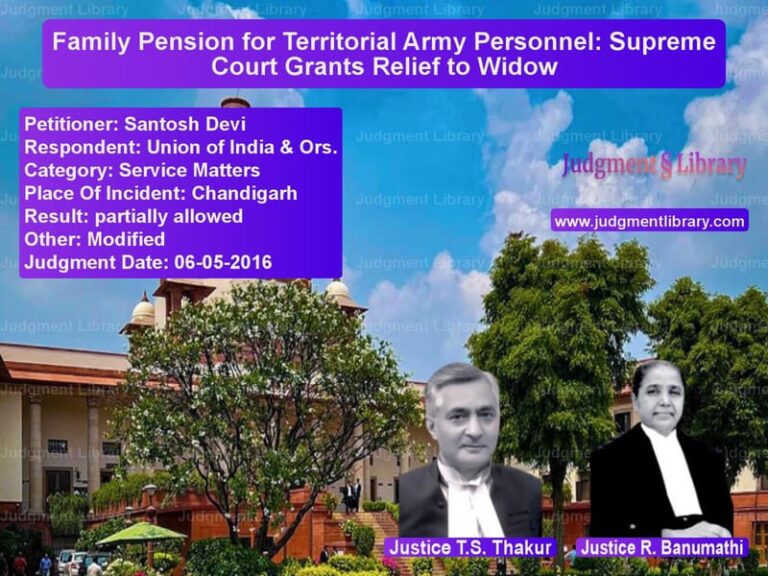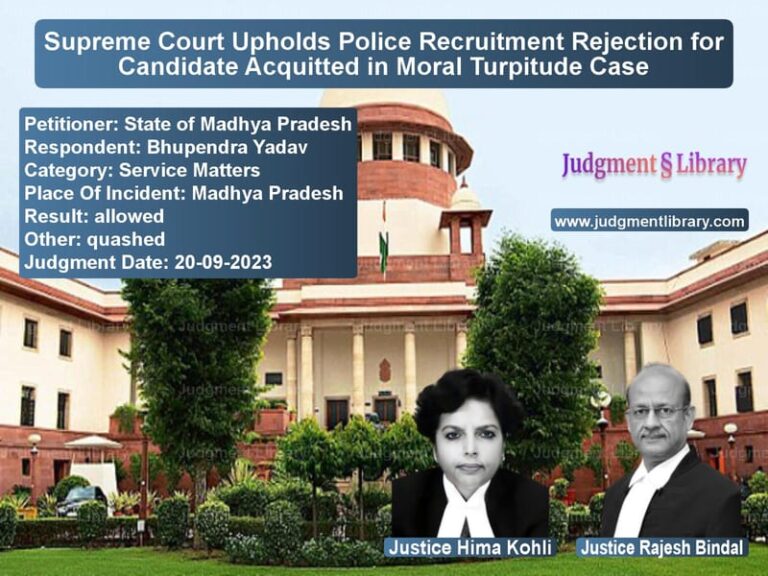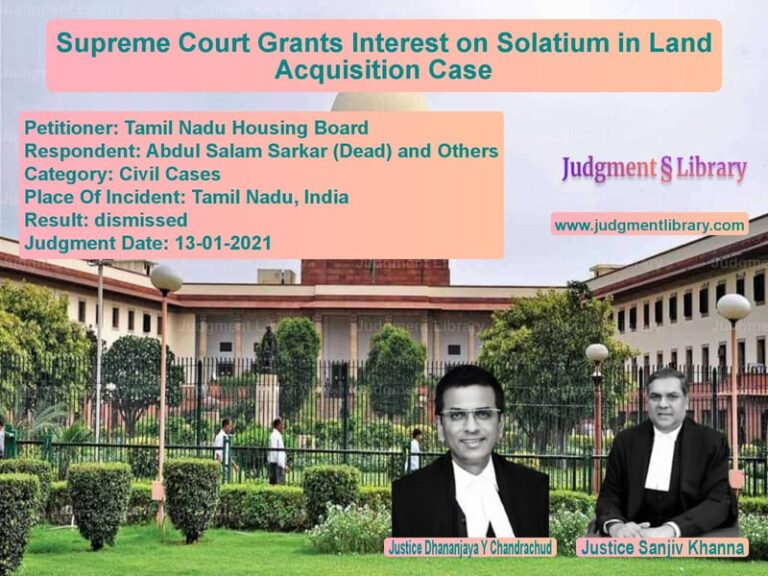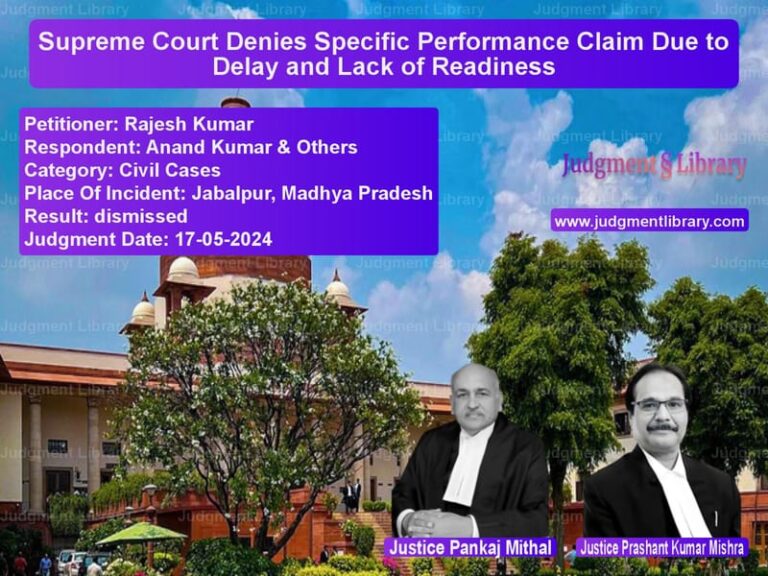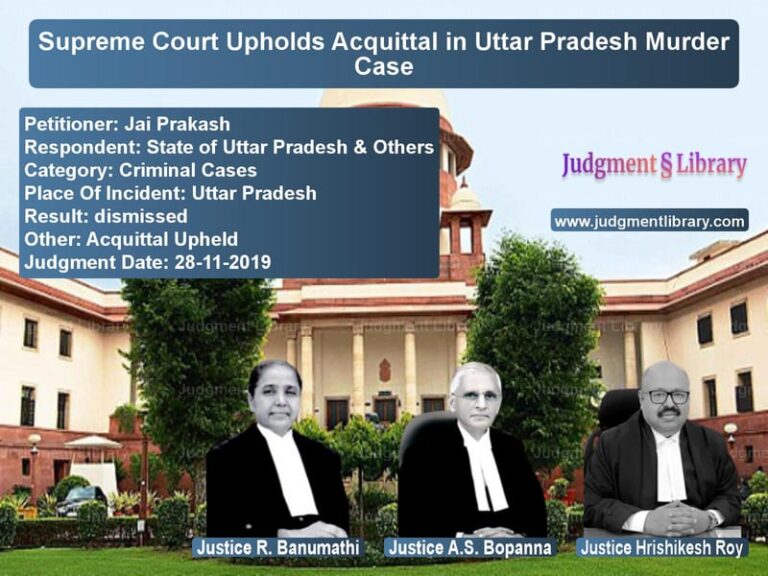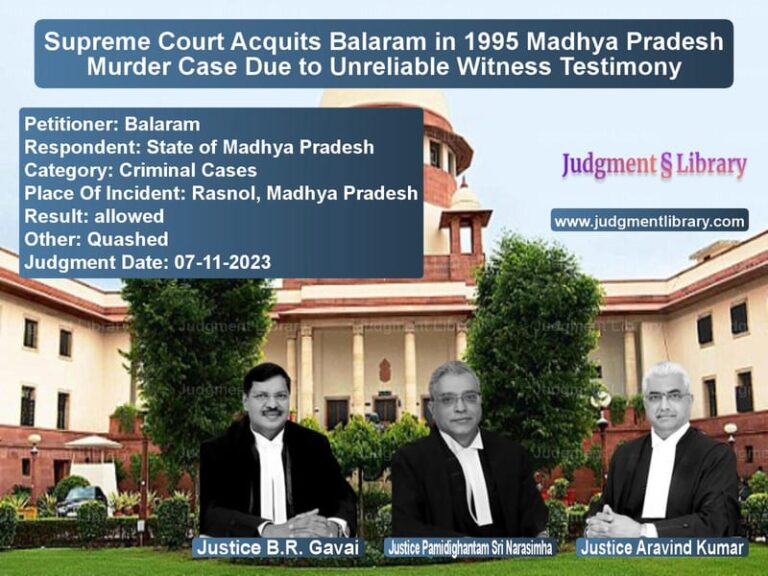Supreme Court Restores Criminal Complaint Against Bihar Police Officer
In an important judgment, the Supreme Court of India restored a criminal complaint against a Bihar police officer that had been quashed by the Patna High Court. The case, Devendra Prasad Singh vs. State of Bihar & Anr., involved allegations of physical assault, wrongful restraint, theft, and intentional insult against the officer. The Supreme Court ruled that the High Court had exceeded its jurisdiction under Section 482 CrPC by quashing the complaint without a proper trial.
The ruling underscores the importance of fair trial principles and the necessity of following due process before dismissing criminal complaints.
Background of the Case
The dispute began when the complainant, Devendra Prasad Singh, alleged that the respondent, a police officer, had committed offenses punishable under the following sections of the Indian Penal Code (IPC):
- Section 323 IPC: Voluntarily causing hurt.
- Section 341 IPC: Wrongful restraint.
- Section 379 IPC: Theft.
- Section 504 IPC: Intentional insult with intent to provoke breach of peace.
Key events of the case:
- 2013: The complainant filed a case against the police officer.
- 2014: The Judicial Magistrate took cognizance of the complaint and issued summons.
- 2014: The accused police officer challenged the complaint before the Patna High Court under Section 482 CrPC (inherent powers of the High Court).
- 2017: The Patna High Court quashed the complaint, ruling that there was no prima facie case against the accused.
- 2019: The complainant appealed the High Court’s decision to the Supreme Court.
Arguments by the Appellant (Devendra Prasad Singh)
The complainant challenged the High Court’s decision on the following grounds:
- The High Court had exceeded its jurisdiction under Section 482 CrPC by interfering at a premature stage.
- The allegations in the complaint were sufficient to warrant a trial.
- The police officer was not entitled to protection under Section 197 CrPC (protection of public servants) because his alleged acts were not committed in the discharge of official duties.
- The High Court wrongly evaluated witness statements, which should have been done at trial.
Arguments by the Respondent (State of Bihar & Anr.)
The police officer defended the High Court’s ruling, arguing:
- The allegations were baseless and politically motivated.
- The case required prior sanction under Section 197 CrPC before proceedings could be initiated.
- The complaint lacked sufficient evidence to proceed to trial.
Supreme Court’s Observations and Ruling
The Supreme Court examined the High Court’s reasoning and found that it had made two critical errors:
1. No prior sanction was required under Section 197 CrPC:
The Court ruled:
“Having regard to the nature of the allegations made by the complainant against the respondent No. 2, who was the Police Officer (SHO) at the relevant time, we are of the view that no prior sanction to prosecute respondent No. 2 under Section 197 Cr.P.C. was required for filing such complaint.”
The judgment clarified that protection under Section 197 CrPC applies only if the alleged acts were committed in the discharge of official duties. Since the alleged offenses involved physical assault and theft, they were not covered under official duty.
2. The High Court had no jurisdiction to assess witness statements under Section 482 CrPC:
The Court held:
“The High Court, while hearing the application under Section 482 Cr.P.C., had no jurisdiction to appreciate the statement of the witnesses and record a finding that there were inconsistencies in their statements, and therefore, there was no prima facie case made out against respondent No. 2.”
The Supreme Court emphasized that such an evaluation should be done during the trial, not at the preliminary stage.
Final Ruling
The Supreme Court allowed the appeal and restored the criminal complaint:
- The case was remanded to the trial court for proceedings on merits.
- The High Court’s decision was set aside as legally unsustainable.
- The trial court was directed to decide the case strictly according to law without being influenced by previous findings.
Implications of the Judgment
The ruling has important implications for criminal law and the scope of judicial review:
- Protection against premature dismissal: The decision reaffirms that High Courts should not interfere in criminal trials unless there is clear abuse of process.
- Scope of Section 482 CrPC: The judgment limits the use of inherent powers to exceptional cases and prevents courts from engaging in fact-finding at the pre-trial stage.
- Limiting public servant immunity: The ruling clarifies that government officials are not immune from prosecution for acts committed outside the scope of their official duties.
The Supreme Court’s ruling in Devendra Prasad Singh vs. State of Bihar & Anr. is a crucial precedent in safeguarding the integrity of criminal proceedings and ensuring that justice is served without undue judicial interference.
Petitioner Name: Devendra Prasad Singh.Respondent Name: State of Bihar & Anr..Judgment By: Justice Abhay Manohar Sapre, Justice Dinesh Maheshwari.Place Of Incident: Bihar.Judgment Date: 02-04-2019.
Don’t miss out on the full details! Download the complete judgment in PDF format below and gain valuable insights instantly!
Download Judgment: Devendra Prasad Sing vs State of Bihar & Anr Supreme Court of India Judgment Dated 02-04-2019.pdf
Direct Downlaod Judgment: Direct downlaod this Judgment
See all petitions in Custodial Deaths and Police Misconduct
See all petitions in Bail and Anticipatory Bail
See all petitions in Judgment by Abhay Manohar Sapre
See all petitions in Judgment by Dinesh Maheshwari
See all petitions in allowed
See all petitions in Remanded
See all petitions in supreme court of India judgments April 2019
See all petitions in 2019 judgments
See all posts in Criminal Cases Category
See all allowed petitions in Criminal Cases Category
See all Dismissed petitions in Criminal Cases Category
See all partially allowed petitions in Criminal Cases Category


